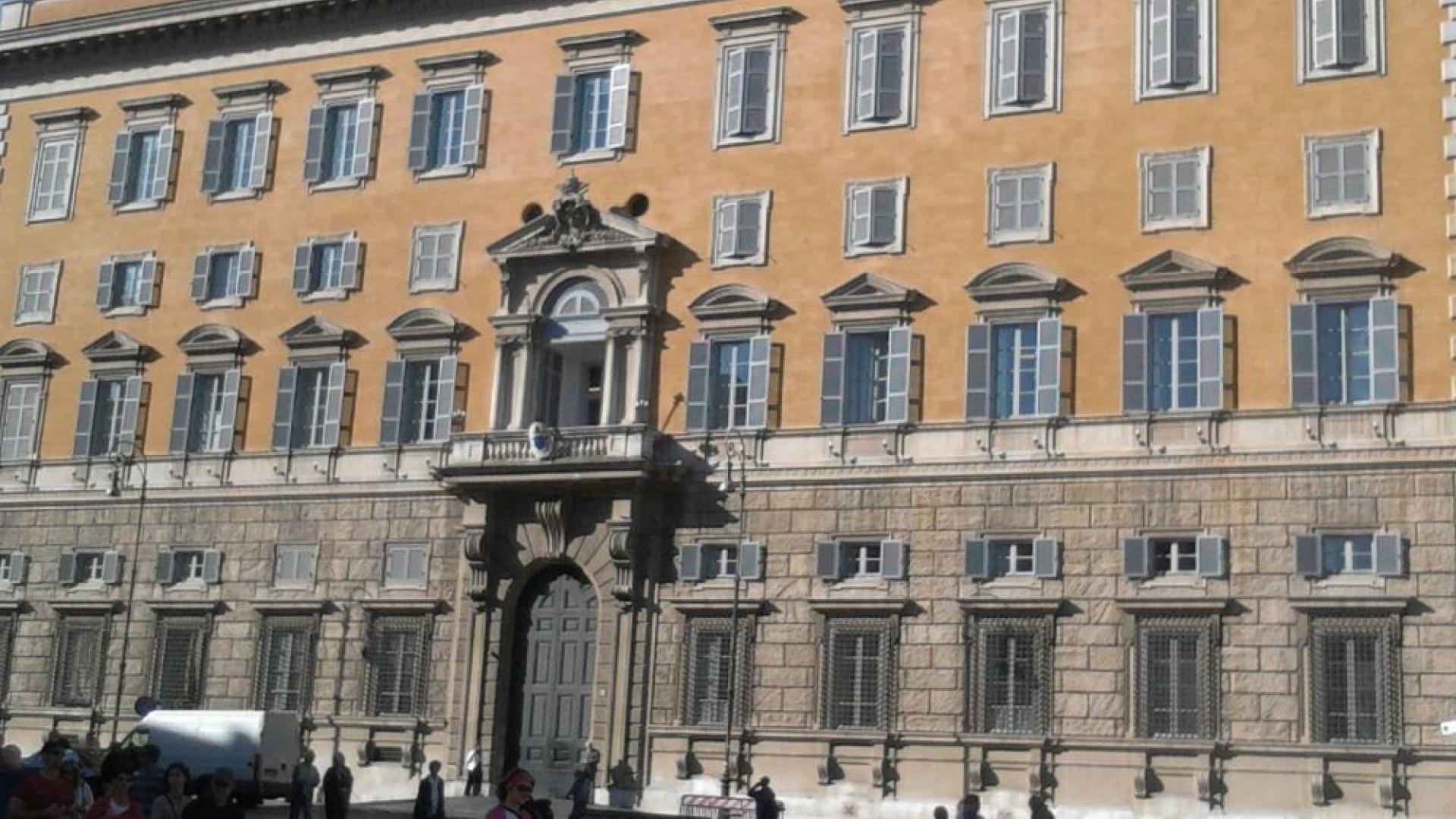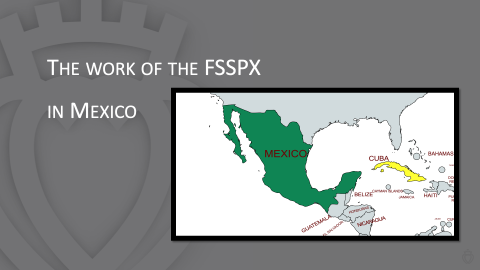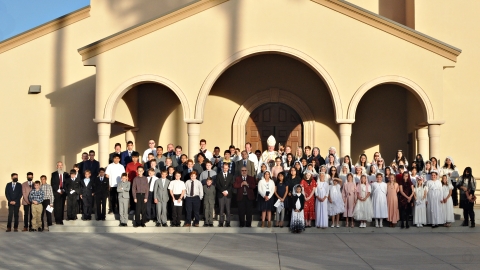Fiducia Supplicans and the “Pastoral Blessing”

“The Church must shy away from resting its pastoral praxis on the fixed nature of certain doctrinal or disciplinary schemes.”
1. This passage from n. 25 of the latest Declaration Fiducia supplicans is merely a repetition of the fundamental principle already spelled out by Pope Francis in the Post-Synodal Exhortation Amoris laetitia. The principle itself finds its justification in number 8 of said Declaration, which refers to number 12 of the new Roman Ritual promulgated by John Paul II in 1985 [“De Benedictionibus, Praenotanda”]. It says: “Blessings are among the most widespread and evolving sacramentals. Indeed, they lead us to grasp God’s presence in all the events of life and remind us that, even in the use of created things, human beings are invited to seek God, to love Him, and to serve him faithfully.” Why? Because their purpose is to “lead us to grasp” and to “remind” us.... To lead us to grasp and to remind us: Does this mean, then, that blessings are nothing but a language, pure signs, achieving no more and no less than an awareness? If that is indeed the case, it is logical that they should adapt, like any language, to the mentality of those to whom they are addressed. For the essential thing, in all pastoral work, is to make oneself understood. From this all the rest follows.
2. And first of all, in order to bless it is enough to get into an attitude of listening to the different persons “who come spontaneously to ask for a blessing” (n. 21). This request in and of itself expresses a person’s need for “God’s saving presence in his life” (n. 20). To ask for a blessing is to recognize the Church “as a sacrament of salvation” (ibid.), “to acknowledge that the life of the Church springs from the womb of God’s mercy and helps us to move forward, to live better, and to respond to the Lord’s will” (ibid.). In short, the request expresses convictions, but what else? Does it express a desire for healing, an effective resolution? Does it express the desire for a conversion? Number 21 is content to mention, on the part of those who ask for the blessing, “sincere openness to transcendence, the confidence of their hearts that they do not trust in their own strength alone, their need for God, and their desire to break out of the narrow confines of this world, enclosed in its limitations.” What about getting out of the state of sin? Apparently there is no question of that here. Which is not surprising at all, since the blessing is a form of listening, because, like all listening, it does not have to worry about effective resolutions. It occurs at the hour of hope and expectation.
3. The blessing is only a form of listening; it must also express God’s love, and this is why it becomes everything for everyone. Of course, it could not possibly “offer a form of moral legitimacy ... to an extra-marital sexual practice” (n. 11). However, “One must also avoid the risk of reducing the meaning of blessings to this point of view alone, for it would lead us to expect the same moral conditions for a simple blessing that are called for in the reception of the sacraments. Such a risk requires that we broaden this perspective further. Indeed, there is the danger that a pastoral gesture that is so beloved and widespread will be subjected to too many moral prerequisites, which, under the claim of control, could overshadow the unconditional power of God’s love that forms the basis for the gesture of blessing” (n. 12). The blessing must therefore express God’s love in differentiated ways. The essential thing is not to “lose pastoral charity, which should permeate all our decisions and attitudes” and to avoid being “judges who only deny, reject, and exclude” (n. 13).
4. The new pastoral “magisterium” inaugurated by John XXIII no longer seeks to convert. You may as well say that it no longer seeks to get souls out of sin. It listens and it dialogues. In doing this, it gives people the means by which to fulfill itself as people, by escaping materialism, in openness to transcendence. “Ultimately, a blessing offers people a means to increase their trust in God. The request for a blessing, thus, expresses and nurtures openness to the transcendence, mercy, and closeness of God in a thousand concrete circumstances of life, which is no small thing in the world in which we live. It is a seed of the Holy Spirit that must be nurtured, not hindered” (n. 33). And what about sin? And conversion? And eternal salvation? Not a word. They just told you: the blessing is there to lead you to grasp “the presence of God in all the events of life.”
5. This is why “the Church must shy away from resting its pastoral praxis on the fixed nature of certain doctrinal or disciplinary schemes.” That is understood, since a blessing is an aspect of pastoral care and pastoral care consists of being a good listener and dialoguing, “leading people to grasp” and “reminding” them. In this field, schemas are unacceptable, “especially when they lead to ‘a narcissistic and authoritarian elitism, whereby instead of evangelizing, one analyzes and classifies others, and instead of opening the door to grace, one exhausts his or her energies in inspecting and verifying’” (n. 25, quoting Pope Francis, [Evangelii Gaudium, n. 94]). Consequently, “when people ask for a blessing, an exhaustive moral analysis should not be placed as a precondition for conferring it. For, those seeking a blessing should not be required to have prior moral perfection” (n. 25). For this is not about conversion. It is about dialogue and listening. The fundamental principle of this listening, which is also the fundamental principle of the New Evangelization, is that “we are more important to God than all the sins we can commit because he is father, he is mother, he is pure love, he has blessed us forever. And he will never stop blessing us” (n. 27). If we adhere to a principle like that, does Hell exist? And if it exists, would it not be rather empty? ... This principle is “to make those people feel that they are still blessed, notwithstanding their serious mistakes, that their heavenly Father continues to will their good and to hope that they will ultimately open themselves to the good” (ibid.). “Open themselves to the good”: in what sense? Is it only the “desire to break out of the narrow confines of this world, enclosed in its limitations” what was mentioned earlier? Logically yes. And this is why the long-awaited conclusion appears inescapable. Same-sex couples, too, have a right to receive the blessing of the Church.
6. This conclusion arrives in black on white, unsurprisingly, in number 31 of the Declaration. “Within the horizon outlined here appears the possibility of blessings for couples in irregular situations and for couples of the same sex.” Of course, the document explains that this blessing will take place in a form “which should not be fixed ritually by ecclesial authorities to avoid producing confusion with the blessing proper to the Sacrament of Marriage.” And number 39 adds to this precaution which is meant to be reassuring—one wonders, moreover, for whom: “to avoid any form of confusion or scandal, when the prayer of blessing is requested by a couple in an irregular situation, even though it is expressed outside the rites prescribed by the liturgical books, this blessing should never be imparted in concurrence with the ceremonies of a civil union, and not even in connection with them. Nor can it be performed with any clothing, gestures, or words that are proper to a wedding. The same applies when the blessing is requested by a same-sex couple.” But number 40 hastens to reopen the doors that were closed in the preceding paragraph: “Such a blessing may instead find its place in other contexts, such as a visit to a shrine (Lisieux?), a meeting with a priest (while leaving church after Mass?), a prayer recited in a group (on the occasion of praying Vespers or the Rosary?), or during a pilgrimage (to Lourdes or Fatima?). Indeed, through these blessings that are given not through the ritual forms proper to the liturgy but as an expression of the Church’s maternal heart—similar to those that emanate from the core of popular piety—there is no intention to legitimize anything, but rather to open one’s life to God, to ask for his help to live better, and also to invoke the Holy Spirit so that the values of the Gospel may be lived with greater faithfulness.” Does that mean that the ritual forms proper to the liturgy are not the expression of the Church’s maternal heart? It seems not, since number 36 explains that trying to make these blessings a liturgical act “would constitute a serious impoverishment because it would subject a gesture of great value in popular piety to excessive control, depriving ministers of freedom and spontaneity in their pastoral accompaniment of people’s lives.” Again this childish, harmful dialectic between authority and freedom, between law and charity, between justice and love. For the moment, remember that this kind of “blessing” can take place inside a church and, why not, at the communion rail, facing the main altar.
7. These blessings will descend “upon those who—recognizing themselves to be destitute and in need of [God’s] help—do not claim a legitimation of their own status, but who beg that all that is true, good, and humanly valid in their lives and their relationships be enriched, healed, and elevated by the presence of the Holy Spirit” (n. 31). Therefore this is about an improvement, starting from what is already good, not about a cure. Absolutely nothing is said about what is wrong and bad, even humanly speaking, much less about sin itself. Nothing about any of this, neither here nor anywhere else in the document. But does sin even exist? The important thing is that “human relationships may mature and grow in fidelity to the Gospel, that they may be freed from their imperfections and frailties, and that they may express themselves in the ever-increasing dimension of the divine love” (ibid.). Imperfections and frailties.... All the same, isn’t this saying too little, when it is an instance of adultery or homosexuality? It is true that “the grace of God works in the lives of those who do not claim to be righteous but who acknowledge themselves humbly as sinners, like everyone else. This grace can orient everything according to the mysterious and unpredictable designs of God” (n. 32). Mysterious and unpredictable designs, yes, there are those which correspond to what theologians call the “divine good pleasure” [i.e. His will, without consulting human beings]. But there is also a “signified” divine will, which is expressed in a manner that is not mysterious at all but rather perfectly clear and corresponds to perfectly predictable designs: the will of God as it is expressed through the Ten Commandments and the law of the Church. Before blessing in every direction, would it not be advisable to recall these requirements and to exhort people as persuasively as possible to comply with them? Number 40 describes the ambitions of this new pastoral approach, “to open one’s life to God, to ask for His help to live better, and also to invoke the Holy Spirit so that the values of the Gospel may be lived with greater faithfulness.” The frivolousness of expressions like this is too vague to avoid fostering procrastination.
8. The impact of this Declaration, which is simultaneously sinister and shameful, will be felt especially among Catholics, who once again will be shaken in their morality and literally scandalized, in other words driven—one could even say exhorted—not just to tolerate now but to accept the unacceptable. The most tangible result, in the immediate future, can be seen on page one of all the newspapers, with competitively screaming headlines proclaiming that the Vatican is finally authorizing (and this is a first) the blessing of homosexual couples.
9. This Declaration is therefore scandalous in the proper sense of the word, and the scandal that it is fomenting is great. Where, then is the “mola asinaria” [millstone] of the Gospel [1]? ... But since God’s goodness is still great, no doubt it will be necessary to make more room in the churches of Tradition, so as to welcome—as in the stable in Bethlehem—all the poor Catholics who are increasingly disappointed with those whom they trusted.
[1] “But he that shall scandalize one of these little ones that believe in me, it were better for him that a millstone should be hanged about his neck and that he should be drowned in the depth of the sea” (Mt. 18:6).
This article’s author, Fr. Jean-Michel Gleize, is professor of apologetics, ecclesiology, and dogma at the Saint Pius X Seminary in Écône. He is the main contributor to the Courrier de Rome and participated in the doctrinal discussions between Rome and the Society of Saint Pius X between 2009 and 2011.
(Source : La Porte Latine – FSSPX.Actualités)
Illustration : Andre0007l, CC BY-SA 3.0, via Wikimedia Commons





